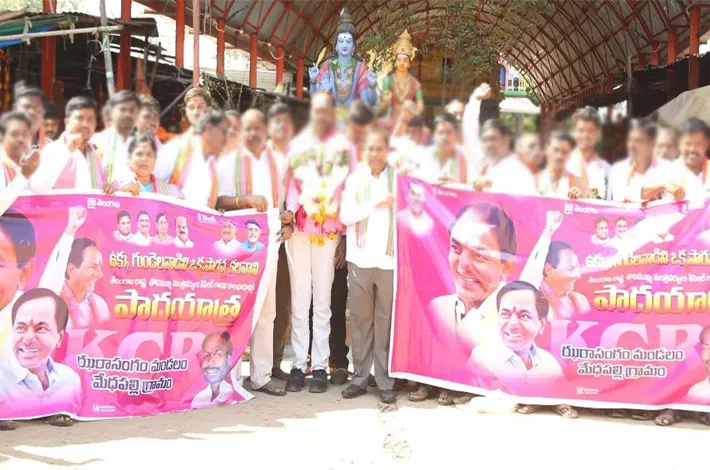The Melody of Sampath
09-04-2025 12:00:00 AM

It was a street musician, an old man with a weathered flute, who changed everything. Sampath, passing by one evening, dropped a few rupees into the man’s bowl. The musician smiled and said, “A man who gives even when his heart is heavy has more worth than gold.”
In the bustling lanes of Old Delhi, where the scent of chaat mingled with the hum of rickshaw horns, lived Sampath, a quiet man with a heart full of unsung melodies. At thirty-two, he ran a modest music shop tucked between a tailor’s stall and a chai vendor. His days were spent repairing old harmoniums, tuning sitars, and dreaming of a life where his own songs could echo beyond the narrow streets. Sampath wasn’t rich or handsome in the conventional sense—his crooked smile and unruly hair set him apart—but his voice, when he sang, could make even the sparrows pause.
Across the street, in a small balcony adorned with marigolds, stood Meera, a painter with eyes like the monsoon sky. She’d moved to Delhi a year ago, fleeing a broken engagement and a family that couldn’t understand her need to create. Meera spent her mornings sketching the chaos below, her afternoons lost in strokes of color, and her evenings listening to Sampath’s faint humming as he worked late into the night. She didn’t know his name then, only that his voice carried a warmth she hadn’t felt in years.
Their worlds collided one humid July evening. A sudden downpour had drenched the market, and Meera, clutching a canvas she’d been working on, darted into Sampath’s shop for shelter. Water dripped from her dupatta, pooling on the wooden floor, and she laughed—an embarrassed, musical sound—as she apologized. Sampath, startled from tuning a guitar, looked up and forgot how to speak. Her wet hair framed her face like a painting, and the canvas she held—a half-finished sketch of the street, with his shop in the corner—felt like a mirror to his soul.
“Nice place to hide from the rain,” she said, breaking the silence.
“It’s not much, but it’s dry,” he replied, offering her a stool and a chipped mug of chai from the vendor next door.
That rainy evening stretched into hours of conversation. Meera spoke of colors and dreams, Sampath of notes and forgotten ragas. She teased him about his crooked smile; he blushed and said her laugh was a song he’d never tire of hearing. By the time the rain stopped, something unspoken had bloomed between them—a fragile, beautiful thing neither dared name.
Days turned to weeks, and their bond grew. Meera began visiting the shop, sketching while Sampath worked, her presence filling the space with light. He’d sing for her sometimes, old Hindi film songs or bits of his own compositions, and she’d paint to his rhythm, her brush dancing to his voice. They were an unlikely pair—her bold and free, him steady and rooted—but in each other, they found what they’d been missing.
Yet love, like monsoon clouds, brought storms. Meera’s family tracked her down, furious she’d abandoned their plans for her. Her ex-fiancé, a wealthy businessman named Vikram, arrived one day, his polished shoes stark against the dusty shop floor. He demanded she return to Mumbai, calling Sampath a “nobody” with no future. Meera stood her ground, but the words stung Sampath deeper than he’d admit. That night, he didn’t sing.
“I’m not enough for you,” he told her the next day, his voice low. “You deserve more than this cramped shop, more than me.”
Meera’s eyes blazed. “You think I care about money? I love you, Sampath—your heart, your songs. Not some life I never wanted.”
He turned away, doubt gnawing at him. For days, they drifted apart, the shop silent without her laughter. Sampath buried himself in work, but every note he played felt hollow. Meera painted alone, her colors muted, her balcony empty without his voice drifting up to her.
It was a street musician, an old man with a weathered flute, who changed everything. Sampath, passing by one evening, dropped a few rupees into the man’s bowl. The musician smiled and said, “A man who gives even when his heart is heavy has more worth than gold.” The words hit Sampath like a chord resolving a melody. He realized he’d been a fool—not for loving Meera, but for letting fear steal her away.
That night, he stood beneath her balcony, a guitar in hand, and sang. It was a song he’d written for her, raw and unpolished, about a man who found his muse in a painter’s eyes. His voice trembled at first, then grew strong, spilling into the night. Lights flickered on in the houses around, but he sang only for her. Meera appeared on the balcony, tears glistening, and when he finished, she ran downstairs, throwing her arms around him.
“I thought I’d lost you,” she whispered.
“Never again,” he promised, holding her close.
They married that winter in a small ceremony, surrounded by chai vendors and stray dogs, with the old musician playing his flute. Sampath’s shop became their home, her paintings lining the walls, his songs filling the air. They weren’t rich, but they were whole—two souls who’d found their melody in each other, against all odds.
And in the heart of Old Delhi, where love bloomed amidst the chaos, Sampath and Meera proved that sometimes, the simplest notes make the sweetest songs.
The Shadow of the Burj
The desert sun dipped below the horizon, casting a golden glow over Dubai’s skyline. The Burj Khalifa loomed like a titan, its glass facade reflecting the city’s ambition and excess. Below, in the labyrinth of luxury malls and neon-lit streets, a deal was about to go wrong.
Amir Khalid adjusted his cufflinks, the weight of the diamond-encrusted watch on his wrist a reminder of the empire he’d built. Smuggling wasn’t glamorous, but it paid—especially when the cargo was rare pink diamonds from a war-torn African mine. Tonight, he was meeting a buyer, a Russian oligarch named Viktor Morozov, in the penthouse suite of the Armani Hotel. The deal was simple: ten million dirhams for a velvet pouch of stones that could fit in your palm.
Amir stepped out of his matte-black Rolls-Royce, handing the keys to a valet who didn’t meet his eyes. He liked it that way—discretion was currency in this game. The elevator ride to the 39th floor was silent, save for the hum of wealth. When the doors slid open, Viktor was waiting, a bear of a man with a scar snaking down his left cheek. Two bodyguards flanked him, their suits straining against muscle.
“Amir,” Viktor growled, his accent thick. “You’re late.”
“Traffic,” Amir lied, setting the briefcase on the glass table between them. He clicked it open, revealing the pouch. “You’ll forgive me when you see these.”
Viktor’s eyes gleamed as he tipped the diamonds onto his palm. They caught the light, shimmering like frozen blood. He nodded to one of his guards, who produced a scanner. The device beeped, confirming their authenticity. Satisfied, Viktor slid a tablet across the table. “Transfer’s ready. Ten million, as agreed.”
Amir tapped in his account details, the numbers glowing green as the funds hit. He stood, ready to leave, when the lights flickered. A split second later, the room plunged into darkness.
Glass shattered. A muffled scream. Amir dropped to the floor, heart hammering. When the lights snapped back on, Viktor was slumped in his chair, a crimson stain spreading across his chest. The bodyguards were gone. The diamonds, the tablet—gone too.
Amir cursed under his breath. This wasn’t a robbery; it was a setup. He bolted for the door, only to find it locked. Sirens wailed in the distance—someone had tipped off the Dubai Police. He scanned the room, spotting the balcony. Thirty-nine floors up, it was a death sentence, but staying meant arrest—or worse.
He grabbed a chair, smashed the balcony door’s lock, and stepped into the humid night. The wind howled, tugging at his suit. Below, the city sparkled, oblivious. A maintenance ladder clung to the building’s edge, a narrow spine of steel. Amir didn’t think—he climbed.
Halfway down, his phone buzzed. Unknown number. He answered, pressing it to his ear against the wind.
“You should’ve stayed in the room, Khalid,” a woman’s voice purred, smooth as silk. “Now you’ve made it personal.”
“Who are you?” he snarled, gripping the ladder as his foot slipped.
“Someone who knows you’re a dead man walking. Check your watch.”
Amir glanced at the diamond timepiece. The face glowed faintly, a tiny red dot blinking at its center. A tracker. His stomach dropped. They’d been playing him from the start.
He ripped the watch off, hurling it into the void, and kept descending. At the 20th floor, he swung onto a service balcony, chest heaving. He needed answers—and a way out. His mind raced to Leila, his tech-savvy ex-partner. She’d cut ties after a botched job last year, but she owed him.
Leila’s apartment in Jumeirah was a fortress of screens and shadows. She opened the door, her dark eyes narrowing. “You look like hell.”
“I’m in it,” Amir said, shoving past her. He explained the ambush, the voice, the tracker. “I need to know who’s behind this.”
Leila cracked her knuckles and sat at her rig. Her fingers flew across the keys, pulling feeds from hotel cameras, police chatter, and dark web forums. “Viktor’s crew didn’t betray him,” she said after an hour. “Someone else crashed the party. Look.”
Grainy footage showed a woman in a black abaya slipping into the penthouse minutes before the blackout. Her face was obscured, but the way she moved—graceful, lethal—sent a chill down Amir’s spine.
“She’s a ghost,” Leila muttered. “No ID, no trace. But the diamonds? They’re already on a private jet to London.”
Amir clenched his fists. “Then I’m going after her.”
Leila grabbed his arm. “You’re not hearing me. This isn’t about the stones. She wanted you framed. You’re the target.”
Before he could respond, the door exploded inward. Men in tactical gear stormed in, shouting in Arabic. Amir dove for the window, glass raining as he hit the fire escape. Leila’s scream echoed behind him.
The city swallowed him as he ran, the Burj’s shadow stretching over the dunes. The hunter had become the hunted, and in Dubai’s gilded cage, there was nowhere left to hide.








